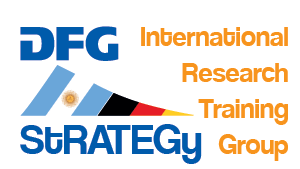International Research Training Group “StRATEGy”

The beginning of the 21st century has seen a radical change in public perception concerning our environment and available resources. The competition for natural resources, increased vulnerability to natural hazards, and the impacts of Global Change have moved the concept of “environmentalism“ from the fringes of public awareness to the focus of many government agendas. Earthquakes, volcanic eruptions, flooding, landslides, water shortages or exploitation of natural resources are just a few of the many manifestations of natural or anthropogenic processes that are increasingly compromising society’s goal of sustainability. The resulting high death tolls and staggering financial losses from natural disasters are leading to a growing awareness of our vulnerability, while the quest for energy resources has resulted in many armed confrontations and geopolitical conflicts. Globalization and the rapid population and economic growth of many nations exacerbate these problems, and are fuelling interest in topics including resource generation and the tectonically and climate-driven processes that impact the Earth’s surface. As a consequence, Earth Science today stands at the vanguard of our attempt to cope with an ever-increasing demand for georesources and changes to the natural environment on a global scale.
StRATEGy’s goal is to establish an international virtual campus devoted to source-to-sink studies in the NW and central Argentine Andes and foreland basin, fostering an exchange and mobility program that transcends traditional disciplinary boundaries. We have chosen foreland basins and their adjacent orogenic interiors as the main focus of our study, because these regions potentially record the links between deep-Earth and surface processes, including volcanism and tectonics, climate and erosion/sedimentation, as well as their impact on metallogenesis, hydrocarbon resource generation, and fluid migration. We will follow an integrative approach in research and teaching that spans the study of geological archives, present-day monitoring, modeling, and communication. The hallmark of this holistic geoscientific approach is to rectify the deficit in transdisciplinary graduate education of tectonically and climatically driven processes in the source-to-sink system of the coupled orogen-foreland basin realm and their relevance for georesource formation. We aim to accomplish these goals by (1) pursuing cutting-edge research targets, (2) employing transdisciplinary research methods, (3) applying state-of-the-art technology, and (4) fostering international collaboration and networking. Our overarching research objectives will follow multidisciplinary, closely meshed work packages (see below). They involve a process-based approach to tectono-magmatic-sedimentary systems and resource formation, addressing different spatiotemporal scales, quantifying critical process thresholds, and deciphering the manifestations of past processes in geological archives and landscapes. To our knowledge, StRATEGy is the first international initiative to decipher, measure, and assess the mechanisms of societally relevant geoprocesses focused on foreland regions, combined with fostering transdisciplinary team efforts and communication. As such, this initiative will help to better evaluate geological, geomorphic and geophysical aspects of other, densely populated foreland regions (e.g., Himalaya).